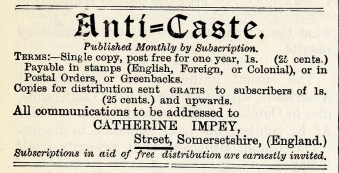 Between 1888 and 1895, Catherine Impey (1847–1923) of Street, Somerset, wrote and published what is credited as being Britain’s first anti-racist periodical. Anti-Caste, as it was called, is one of the most remarkable serials in our collection: the Library holds the only complete set known to have survived in this country. It includes reports on visits to Britain by prominent African American campaigners such as Ida B. Wells and Frederick Douglass, and anti-lynching campaigns in the southern states of America, as well as looking at issues of racism within the British Empire.
Between 1888 and 1895, Catherine Impey (1847–1923) of Street, Somerset, wrote and published what is credited as being Britain’s first anti-racist periodical. Anti-Caste, as it was called, is one of the most remarkable serials in our collection: the Library holds the only complete set known to have survived in this country. It includes reports on visits to Britain by prominent African American campaigners such as Ida B. Wells and Frederick Douglass, and anti-lynching campaigns in the southern states of America, as well as looking at issues of racism within the British Empire.
Catherine Impey edited the newsletter with her sister, Ellen, and mother, Mary Hannah Impey. She sold it for the nominal sum of a halfpenny (to cover postage) to aid circulation, bearing the main production costs herself.
While Anti-Caste had only 300 subscribers (mainly within the Society of Friends) it had a circulation of 1900 copies each month, as many subscribers would distribute free copies of the journal amongst their associates. For instance, 500 copies were distributed amongst the YMCA in the USA and 100 copies taken by a Reverend Foster in South Carolina.
In the first issue of Anti-Caste, Impey declared that it should be a platform for black writers to “present their case before white races”. Its moral stance was one of racial equality, not protective philanthropy, as the change of masthead wording after 18 months seems to suggest (from “Devoted to the interests of coloured races” to “Advocates the brotherhood of mankind irrespective of colour or descent”).


Impey became interested in the topic of race relations and racism in the USA after visiting the country several times in the 1870s. She was friends with several prominent African American campaigners, most notably Frederick Douglass.
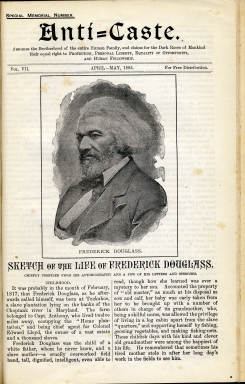 Article, ‘Sketch of the Life of Frederick Douglass’, Anti-Caste, April-May 1895.
Article, ‘Sketch of the Life of Frederick Douglass’, Anti-Caste, April-May 1895.
(click on image to enlarge)
The most controversial issue of Anti-Caste was that of January 1893 (volume VI, no. 1), which included on its cover a photograph of a lynched African American man with children posing beside his body.
Catherine Impey arranged for Ida B. Wells (who had been introduced to her by Frederick Douglass) to go on a lecture tour of Britain in 1893 on the issue of lynching. This tour led to the formation of two societies – the British Anti-Lynching Society and the Society for the Recognition of the Brotherhood of Man.
Anti-Caste also covered questions of racism within the British Empire, particularly India. An example of this is the May 1890 issue, where Impey denounced the conditions for workers on Assam tea estates.
Article, ‘A Blot on the Modern Administration of India’, Anti-Caste, May 1890.
(click on images to enlarge)
When a controversy arose over the British Prime Minister Lord Salisbury referring to Indians as “black men”, Impey used the January 1889 issue of Anti-Caste to condemn the racist philosophy underpinning British Imperialism.
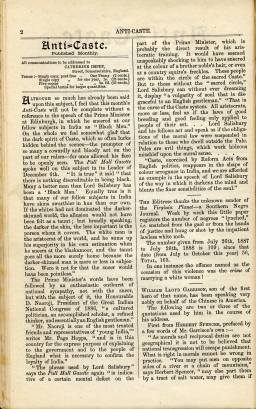 Article concerning British Prime Minister Lord Salisbury’s speech, Anti-Caste, January 1889.
Article concerning British Prime Minister Lord Salisbury’s speech, Anti-Caste, January 1889.
(click on image to enlarge)
Sadly, apart from Anti-Caste, little survives of Catherine Impey’s writing. Much of what we know about her comes from Ida B. Wells’ autobiography Crusade for justice and from Anti-Caste itself.
We know that as well as anti-racism, Impey was interested in temperance, anti-militarism and animal rights (she was a committed vegetarian). She also wrote an article for the Street Village Album in 1887 arguing for women’s right to vote.
Catherine Impey died in 1923. Her obituary in the Quaker newspaper The Friend mentioned her work against racism, but focused more on her interest in temperance. Her pioneering work was all but forgotten. Today there is growing recognition and interest in Catherine Impey and her periodical Anti-Caste.
References / Further reading
Bressey, Caroline. “Catherine Impey and the Anti-Caste movement: part 1”. BASA Newsletter, no. 52 (2008), p.12-15.
Ware, Vron. Beyond the pale: white women, racism and history. London: Verso, 1992.
UCL Equiano Centre. Anti-Caste gallery [website]. Accessed 1 September 2012.

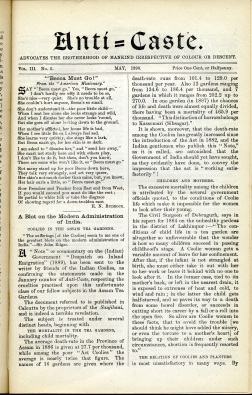
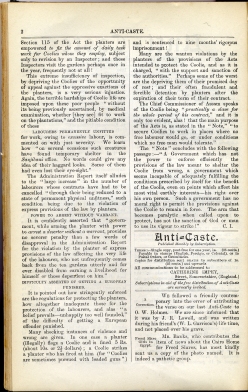
Reblogged this on Shelf Fulfillment.
My Name is Catherine Impey born in 1949 now living in Barbados. My father was from a Quaker family. I am very proud of my name sake and have the same strong anti-racist views and hope we are actually related. If there is more information about her, I would love to find it.
It’s a great name! We will get in touch with a copy of her obituary from The Friend, the Quaker weekly magazine.
Since my previous message, I checked with a member of my family who keeps historical information and I am pleased to say that I am related to Catherine Impey of Street. I am so proud of this fact!!
Pingback: Women’s History Month | Quaker Strongrooms
Hello, I am dong research on the African American poet Paul Laurence Dunbar who was a friend of Ms. Impey’s and visited her in Street.Caroline Bressey’s book makes mention of a two page entry Dunbar made in the guest book. Can someone please advise me as to how to find out exactly what Dunbar wrote?
Hello Frederick! We don’t hold any personal papers of Catherine Impey (which could potentially include a guest book) but there are some at the Clarks Archives held by the Alfred Gillett Trust in Street, Somerset where Impey was from, and there may also be some held by the local archives in Somerset. You can contact Alfred Gillett Trust here: https://alfredgilletttrust.org/contact/
This is 2 years too late, I’m sure but “Catherine Impey – Coda by Liam Drew” states:
In Street, Dunbar wrote in the guest book that he was at first mistaken for a burglar (by whom, he doesn’t say). Then, he said that he finished his first novel at Askew. Six years later, he would dedicate a book of poetry to Catherine Impey. To sign off his stay, he penned a short verse entitled In Somerset:
When days were dark & life seemed drear
Dear friends, you kindly asked me here
I thought the year had passed its prime
But woke to find it summer – time
—
One thinks that days of summer pass
Like fleeting forms before a glass;
Tis false: your home shall prove it yet,
For here, indeed, the Summer’s set!
Heleninecuador! Never too late! Thank you!
I’m glad I wasn’t too late! I’m currently researching her as she will have a chapter in my book Intrepid Women of Somerset, due to be released next year.
Hello, where could I find the Anti-Caste volume 1, April 1889 pamphlet
Hi Reginald, could you please email library@quaker.org.uk and we can respond with information about how to access Anti-Caste, thanks!
Meeting Catherine Impey for the first time, (in Quaker Women 1800 – 1920 ed Healey and Spencer, which I’m reviewing for Friends’ Journal, PA), I note that Catherine Impey lived in ASKEW – I wonder if there is any connection with the Askew/Ayscough family of Lincolnshire – including ANNE ASKEW (who was burnt at the stake in 1546,